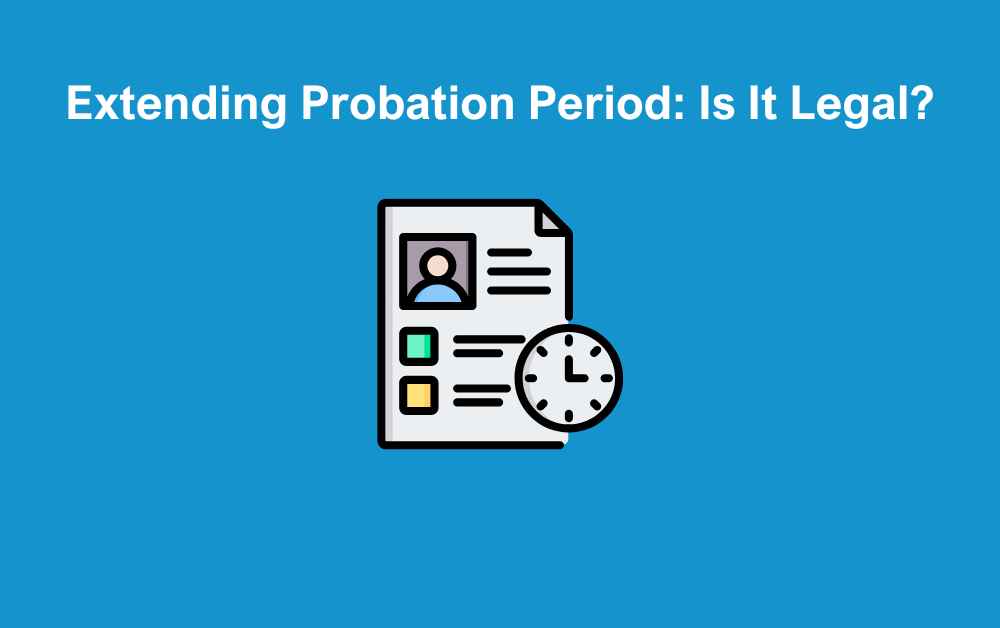Extending probation period can be a tricky area for employers. While probation gives you valuable time to assess whether a new hire is the right fit, sometimes the initial period just isn’t long enough to make a confident decision. Perhaps performance has been inconsistent, training was delayed, or the role has evolved since the employee started.
In short, yes, you can extend a probation period. But before you decide to extend, it’s important to understand the legal and contractual considerations involved — and the steps you should take to ensure the process is fair, compliant, and well-communicated.
What is a probation period?
A probation is a set period of time an employer gives to evaluate a new employee’s suitability to the role and the workplace. While interviews can hint at a candidate’s suitability, the real test is seeing them perform the role and meet the expected standards in practice. Therefore, a lot of employers set a trial period at the beginning of employment to give them time to evaluate if they can be a permanent member of staff.
How long is a probation period?
There are no specific employment laws that set a fixed length for probation periods. However, the most common duration is between three and six months. This gives managers enough time to carry out regular performance reviews and make a more informed decision. At the end of this period, employers will typically either confirm the employee in their role, end their employment, or extend the probation period.
There are no strict rules on how long a probation can be extended — this is at the employer’s discretion. However, it is unusual for the extension to exceed the length of the original period.
Common Reasons to extending Probation Period
There are many reasons why managers may want to extend a probation period. The most common reasons include:
- More time is required to evaluate performance and conduct
- The employee has been absent throughout most of the trial
- Avoid a premature decision and save on recruitment and on-boarding costs
- To provide further training
- To give the employer as much opportunity as possible to prove they can make it work in the long-term.
How to Inform an employee their probation period has been extended?
Once you have taken the decision to extending probation period, you must make the worker aware as soon as possible. This should be done at their final scheduled review meeting. You must then follow this with a probation period extension letter. This should include:
- The decision to extend the trial
- The reason why the decision was made
- The length you are extending probation period
- Support available
- How progress will be reviewed
- Targets and goals
How to manage a probation extension period
Managing a probation extension effectively is key to giving the employee a fair chance to improve while protecting your business interests. A clear plan, consistent communication, and proper documentation will help ensure the process is fair, compliant, and productive. Here are steps to ensure efficiency during this extension:
- Set out clear goals and targets to help staff understand expectations and give managers good points of reference.
- Schedule Regular performance reviews is the best way to monitor and assess performance.
- Employee Support is essential to make extending probation period successful. You can provide this through training or supervision.
Dismissal during probation
If you have taken the decision to dismiss an employee due to capability or conduct during their probation period, it’s important to follow a fair and lawful process. You must give the employee the opportunity to respond to the accusations. This can be done at a review meeting and a detailed record should be kept of the concerns raised and how they were addressed.
Any dismissal decision should be given to the employee in writing, including the reasons and the termination date. In most cases, they are entitled to at least one week’s notice, unless their contract allows for longer.
Even during probation, employees retain basic statutory rights, such as protection from unlawful discrimination and automatically unfair dismissal. For example, ending employment due to a protected characteristic like pregnancy or disability could breach both.
How The HR Booth can help
At The HR Booth, we regularly advise employers on managing probation periods fairly and lawfully. Whether you need help drafting clear probation clauses, handling performance concerns, or communicating an extension, our expert team can guide you through each step to minimise risk and maintain good employee relations. We can also provide template letters, manager training, and tailored advice to ensure your processes are compliant and consistent.
Contact Us
If you would like support with extending probation period or managing any aspect of the probation process, get in touch with our team today. You can call us on 01383 668 178, or email advice@thehrbooth.co.uk, or complete our online contact form. We’ll be happy to discuss your needs and provide practical, straightforward advice.







